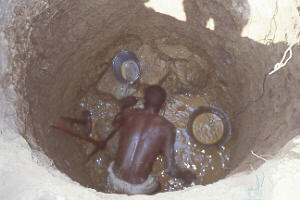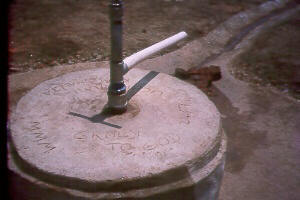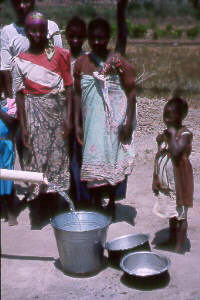| Stephen pointed to the shallow well located near his Malawian village and
said simply, "Now my children don't die anymore." In
one sentence he summed up the entire reason for the Marion Medical Mission's shallow wells
project - to provide protected drinking water for people in an area so rural and so poor
that this basic need is rarely met. |
 |
 |
Malawi, Africa, is the world's third poorest country. Average annual income is around
$150; the current life expectancy is 36 years. Health problems abound, and many of them
are related to water-borne disease.
Marion Medical Mission (MMM) has been
providing shallow wells in northern Malawi since 1990. Under the founding leadership of
Tom Logan, MMM seeks funding and volunteers for the shallow wells program and sends teams
each fall to assist in installation and dedication of these new, protected water sources.
At the end of the 1999 installation season, MMM had provided over 1000 wells, insuring
clean water for about 300,000 people. |
| What makes the Marion Medical Mission program so special is the simple
fact that it is both self-help and sustainable. Villages which desire a shallow well must
make commitments and are expected to take responsibilities - concepts not always wide
spread in the third world or among Western helping agencies. When a village requests a
well, they must make a formal application to MMM. When a site is approved, the villagers
dig the well using very basic hand tools to a depth of 15 to 20 feet. They make brick to
line the well and install it using concrete purchased with funds from MMM. Pumps for the
wells are manufactured at the Embangweni mission hospital, again using funds from MMM.
Marion Medical Mission teams provide transportation to get concrete, pipes and pumps
to the villages, many of which are so far in the bush that no roads go there. Pumps are
installed by the shallow wells team - Malawians trained by Marion Medical Mission
specifically to do this work. When the pump is in place, the team teaches the village
proper use of the well, sometimes using a familiar tune with the words: "This is the
way we pump de pump, pump de pump, pump de pump..." |
 |
 |
A Marion Medical Mission volunteer then dedicates the well with prayer
and echos the words etched in the concrete cover: "Ucindami Kwa Chiuta" (Glory
to God) The volunteer explains to the gathered villagers that this is now their
well. It is not Marion Medical Mission's well, or Tom Logan's well, but it belongs to the
village. And since it is their well, they are now responsible for taking care of it. They
are expected to pay a maintenance fee of two bags of maize yearly which will cover the
cost of replacement parts. When a well breaks down, a shallow wells volunteer from the
village will fix it and the villagers are reminded to "take care of him"
by giving him a gift such as a chicken for his work. For a people so deep in poverty,
these are no small commitments. But the very fact that these commitments are required is
the basis for the outstanding success of this program. All over northern Malawi, the
Marion Medical Mission shallow wells program is known and spreading. A pilot program was
started in 1999 near the capital city of Lilongwe. Enthusiasm in the United States
threatens to overwhelm the current boundaries of the program. |
| It seems like such a small thing - a glass of clean water. Most people in
the United States take it for granted. We do not even consider that our babies might
contract cholera or dysentery from the water they drink - much less that they might die.
Even the cost is, for many of us or for our churches, a small thing. Each shallow well
costs $300 for pump, pipe, cement and transportation. Marion Medical Mission has no
overhead expenses and all volunteers pay their own way to Africa as well as their living
expenses while in country. Part of MMM's mission statement is to spend everything received
each year on direct mission in Africa. They are fond of stating "not even the
cost of a stamp is deducted." Donations go to the shallow wells program and to
the other programs of MMM, which include the Embangweni Hospital, three primary schools
which have received help with buildings and renovations and the Embangweni School for Deaf
Children. |
 |




